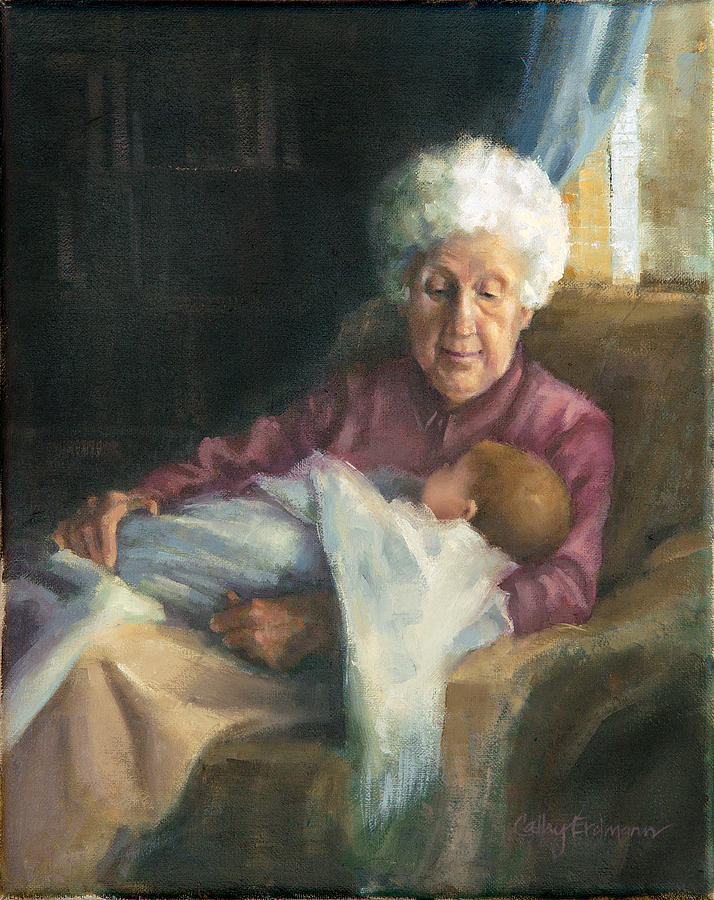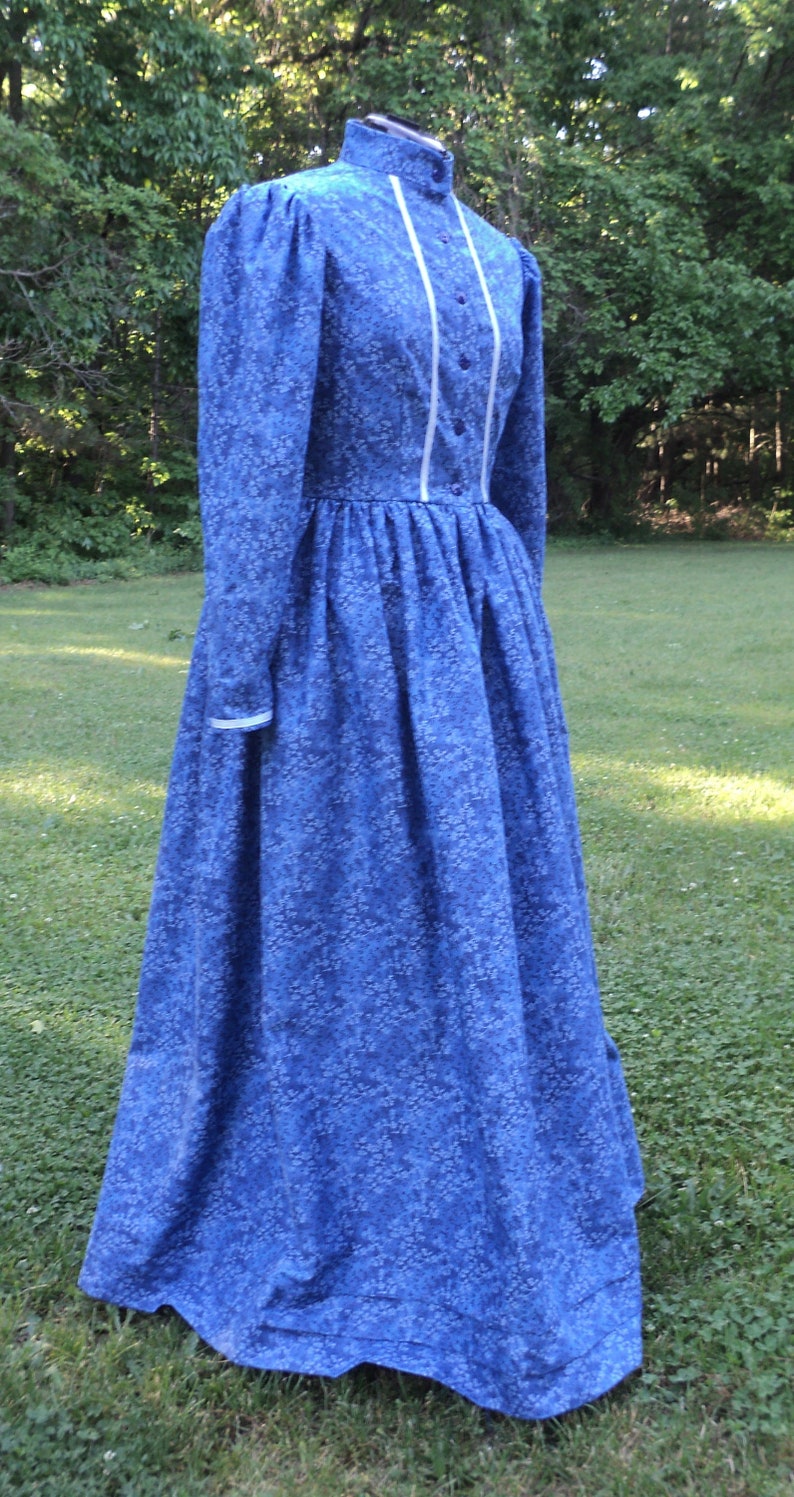Grandma was minding the baby.
"Oh yes, she is sweet," she said, "but she is no rarity to me.
You see there were ten of us at home, and I was the oldest
save one, and that a boy. Seems like I've always
had a baby to take care of."
Holding Grandma's Heartstrings
(2014)
Cathy Erdmann
There were the little ones at home, then when I was older,
I use to go help the neighbors at times; and there was always
a new baby, for women in them days didn't hire help
unless they were down sick.
I use to go help the neighbors at times; and there was always
a new baby, for women in them days didn't hire help
unless they were down sick.
When I was married, I had eleven of my own; now it's
the grandchildren. No, indeed! Babies are no rarity to me!
I was just a child myself when father and mother drove an ox team into
the Ozarks. Father stopped the wagon in the thick woods by the big
road, cut down some trees, and made a rough log cabin.
the grandchildren. No, indeed! Babies are no rarity to me!
I was just a child myself when father and mother drove an ox team into
the Ozarks. Father stopped the wagon in the thick woods by the big
road, cut down some trees, and made a rough log cabin.
But mother never liked the house there;
father was away so much, and she didn't like to stay
alone with the young ones so near the road.
The Ozarks was a wild, rough country then, and all kinds
of persons were passing; so father built another house down
by the spring out of sight, and we lived there.
of persons were passing; so father built another house down
by the spring out of sight, and we lived there.
The woods were full of wild turkey and deer; when we children
hunted the cows at night, we thought nothing of seeing droves of them.
Snakes were thick too, and not so pleasant to meet; but none of us ever
got bit, though we went barefoot all summer and until freezing weather.
hunted the cows at night, we thought nothing of seeing droves of them.
Snakes were thick too, and not so pleasant to meet; but none of us ever
got bit, though we went barefoot all summer and until freezing weather.
Old cabin in the Ozarks
Father use to tan the hides of deer and cattle and make our shoes,
but later we had 'boughten' shoes. Then the men of the settlement
would drive their oxen teams south into the pineries in the fall and
haul in logs to the mills. When they hauled a certain number of loads,
they were paid with a load of logs for themselves.
but later we had 'boughten' shoes. Then the men of the settlement
would drive their oxen teams south into the pineries in the fall and
haul in logs to the mills. When they hauled a certain number of loads,
they were paid with a load of logs for themselves.
These they sawed into lumber and hauled the lumber to Springfield
or Marshfield, seventy-five or one hundred miles, and sold it to get
their tax money and shoes for the family.
or Marshfield, seventy-five or one hundred miles, and sold it to get
their tax money and shoes for the family.
The men worked away a good deal and the mothers and children made
the crops. Neighbors were few and far apart, but we were never lonely;
didn't have time to be. We raised wheat and corn for our bread; hogs
ran loose in the woods and, with venison and wild turkey, made our meat;
we kept some sheep for the wool, and we raised cotton.
the crops. Neighbors were few and far apart, but we were never lonely;
didn't have time to be. We raised wheat and corn for our bread; hogs
ran loose in the woods and, with venison and wild turkey, made our meat;
we kept some sheep for the wool, and we raised cotton.
Workers in the field
After we had gathered the cotton from the fields, we handpicked it from
the seeds. We carded the cotton and wool and then spun them into yarn and
thread and wove them into cloth; we made our own blankets and coverlets
and all the cloth we used, even our dresses.
the seeds. We carded the cotton and wool and then spun them into yarn and
thread and wove them into cloth; we made our own blankets and coverlets
and all the cloth we used, even our dresses.
We worked long days. As soon as we could see in the morning, two of us
would go into the woods and drive up the oxen for the day's work.
would go into the woods and drive up the oxen for the day's work.
Then we girls worked all day in the fields while mother
worked both in the house and out.
worked both in the house and out.
Soon as supper was over, we built a brush fire in the fireplace to
make light, and while one tended the fire to keep it bright, the others
spun and wove and knit and sewed until 10 or 11 o'clock.
make light, and while one tended the fire to keep it bright, the others
spun and wove and knit and sewed until 10 or 11 o'clock.
Passing a house after dark, anytime before midnight, you could always
hear the wheel awhirring and the loom at work. We cooked in the fireplace
too, and I was sixteen years old before I even saw a cookstove.
hear the wheel awhirring and the loom at work. We cooked in the fireplace
too, and I was sixteen years old before I even saw a cookstove.
When the crops were raised, mother and we children did the threshing.
The wheat was spread on poles with an old blanket under them to catch the
grain as it dropped through; and we flailed it out with hickory poles, then
blew the dust out in the wind, and it was ready to take to the mill.
The wheat was spread on poles with an old blanket under them to catch the
grain as it dropped through; and we flailed it out with hickory poles, then
blew the dust out in the wind, and it was ready to take to the mill.
We were taught to be saving. The shoes bought in the fall must last a year,
and we were careful with them. When they got calico into the country, it cost
25 cents a yard, and if we had a calico dress we wore it for very best.
When we took it off, we brushed off all the dust, turned it,
folded it, and laid it carefully away.
and we were careful with them. When they got calico into the country, it cost
25 cents a yard, and if we had a calico dress we wore it for very best.
When we took it off, we brushed off all the dust, turned it,
folded it, and laid it carefully away.
I never got much schooling. There was three months school in the year
beginning the first Monday in September, but that was molasses-making,
potato-digging, corn-picking time, and we older children had to stay home
and do the work. The little ones went, and by the time they were older,
we had things in better shape so they got lots more learning.
But it was too late for us.
beginning the first Monday in September, but that was molasses-making,
potato-digging, corn-picking time, and we older children had to stay home
and do the work. The little ones went, and by the time they were older,
we had things in better shape so they got lots more learning.
But it was too late for us.
Now school comes before the work at home, and when children go
to school, it takes up all their time; they can't do anything else.
to school, it takes up all their time; they can't do anything else.
I wish folks now had to live for a little while like we did when I was young
so they would know what work is and learn to appreciate what they have.
They have so much they are spoiled, yet every cent they get they must
spend for something more. They want cars and pianos and silk dresses.
so they would know what work is and learn to appreciate what they have.
They have so much they are spoiled, yet every cent they get they must
spend for something more. They want cars and pianos and silk dresses.
Why when I was married, all my wedding clothes were of my own spinning
and weaving, but my husband was so proud he wouldn't let me wear
my linsey dresses but bought me calico instead.
and weaving, but my husband was so proud he wouldn't let me wear
my linsey dresses but bought me calico instead.
Ah, well, times have changed! I'm an old woman and have worked hard
all my life but even now I can work down some of the young ones."
all my life but even now I can work down some of the young ones."
Old-fashioned calico dress
"When Grandma Pioneered"
(August 1921)
By Laura Ingalls Wilder
(1867-1957)
Prolific American writer and pioneer girl
(August 1921)
By Laura Ingalls Wilder
(1867-1957)
Prolific American writer and pioneer girl
Taken from the book,
Little House In The Ozarks
A Laura Ingalls Wilder Sampler
The Rediscovered Writings
Edited by Stephen W. Hines
Guideposts Edition
(1991)
Little House In The Ozarks
A Laura Ingalls Wilder Sampler
The Rediscovered Writings
Edited by Stephen W. Hines
Guideposts Edition
(1991)





No comments:
Post a Comment